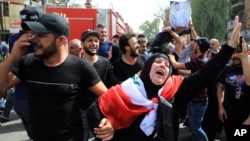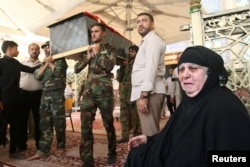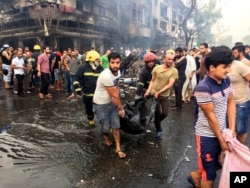Baghdad province is one of the smallest in Iraq but it is home to more of the country's population than any other. It is also where, month after month, more people are killed by acts of terrorism or armed violence than anywhere else.
United Nations data from June showed 236 of the 382 civilians killed in Iraq last month died in Baghdad. Those numbers will go up in July, after Sunday's suicide truck bombing in the city of Baghdad killed at least 175 people and wounded 200 others.
Rescuers are still going through the blast site in the Karrada district looking for people who are missing in one of the deadliest attacks to hit the capital since the U.S. invasion in 2003.
Islamic State militants claimed responsibility for the bombing, saying they were targeting the Shi'ites.
The attack came near the end of the Muslim holy month of Ramadan, a time when U.N. envoy for Iraq Jan Kubis had hoped there would be a lull in violence.
"The terrorists did not spare an occasion to strike at markets, mosques and areas where people gathered in order to exact maximum casualties among civilians, despite the religious occasion and in total disregard for the values of Islam," Kubis said.
Sunday's attack in Baghdad points to the militants' continued ability to mount their campaign of violence as Iraqi forces fight them on the ground and a U.S.-led coalition bombs them from the air.
Islamic State swept into control of large areas in northern and western Iraq, and eastern Syria, two years ago. That offensive coincided with a huge jump in casualties among civilians and Iraqi security forces that peaked at more than 2,600 deaths in June 2014. It fell to 1,466 in June 2015 and 662 last month.
With the violence persisting, Prime Minister Haider al-Abadi got an angry reception Sunday when he visited the area of the truck bombing, with some people throwing stones and other objects to express their contempt. He ordered tighter security measures in Baghdad.
The government also announced Monday the execution of five convicted terrorists and said authorities had arrested 40 people suspected of planning more attacks.
Deadliest IS Attacks in Iraq This Year
July 3: Suicide truck bombing kills 175 in Baghdad's Karrada neighborhood
June 9: Two suicide bombers kill more than 20 in Baghdad
May 17: Wave of bombs across Baghdad kill almost 70
May 11: Car bombs in Baghdad kill more than 75, deadliest attack was at Sadr City market
March 25: Suicide blast kills 30 south of Baghdad
March 6: Suicide truck bomber kills 47 in Hilla
February 28: Attacks across Baghdad kill dozens






